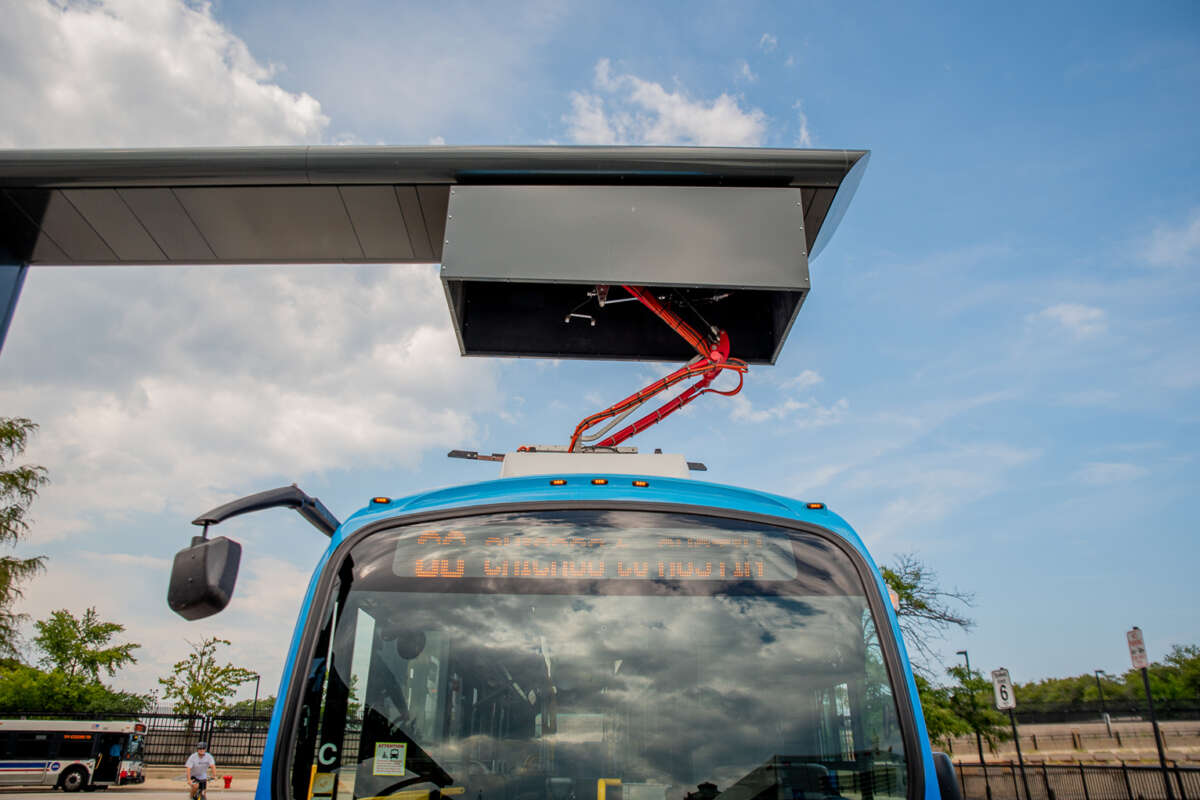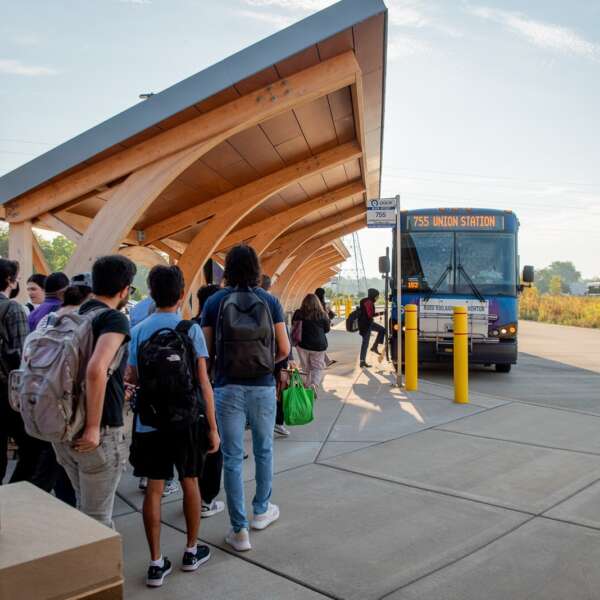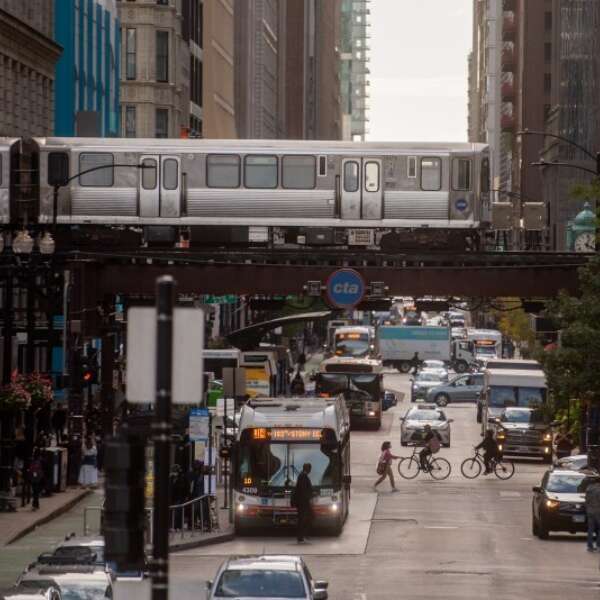Accelerating the transition to a zero-emission regional transit system
April 20, 2023
April 20, 2023

This post is one in a series exploring the Agenda for Action and Advocacy in Transit is the Answer, the RTA’s new regional transit strategic plan. Together with our partners, working toward the items on this list will move us closer to the plan’s vision of a public transportation system that is safe, reliable, and accessible that connects people to opportunity, advances equity, and combats climate change.
Increased attention on the climate crisis and air quality issues have led to more scrutiny of transportation emissions in the Chicago region, throughout the United States, and across the world in recent years. And while reducing emissions will benefit all Chicagoland residents, it’s important to note the impacts of air pollution from cars, trucks, and other sources are not distributed evenly across our region. People of color and populations experiencing low incomes are disproportionately exposed to higher levels of dangerous air pollution and suffer negative health outcomes as a result.
Transit plays an instrumental role in advancing sustainability by reducing driving. While RTA analysis shows that emissions from transit vehicles make up less than 2% of total transportation emissions in the region, transit operators can cement their place as the anchors of a more sustainable network by electrifying.
During the development of Transit is the Answer, working groups comprising more than 100 riders, advocates, agency staff, and stakeholders expressed that accelerating the transition to a zero-emission regional transit system was a priority. While the past several years have seen increased urgency in electrification of bus fleets, working groups pushed for an even faster pace and improved coordination in adoption of green transit technologies including a target of eliminating all fossil fuel transit and fleet vehicles by 2040. Working groups also envisioned improved planning efforts to fortify the regional network against climate and other disruptions including infrastructure emergencies and labor shortages. Lastly, working groups recommended establishing a funding or incentive program for the Service Boards and local communities to implement green infrastructure solutions in areas near transit.
The CTA, Metra, and Pace have been on a path to zero emissions for some years. The CTA released their Charging Forward plan in 2022 to inform the major decisions that comprise CTA’s plan to fully electrify its bus fleet by 2040, including assessing equity and environmental justice impacts. Metra announced in 2022 that it plans to convert six locomotives to battery electric, demonstrating a commitment to innovation and cleaner energy. As part of their Driving Innovation plan, Pace committed to a goal in 2022 of a 100% zero emissions fleet by 2040 to reduce its carbon footprint and improve the quality of the community’s environment. Pace also purchased 20 Proterra ZX5 Electric Buses and EV Fleet Charging Infrastructure last year, and the agency’s 2023 Capital Program includes an additional $60 million for electrification and expansion of North Division in Waukegan.
Transit is the Answer calls on the RTA, CTA, Metra, and Pace to work together to develop a regional transit climate action plan that builds upon existing Service Board plans and identifies opportunities for transit to support the region’s climate action goals, outlines regional strategies that will encourage more people to ride transit, and charts a course to reduce the footprint of the transit system and move toward zero-emissions for transit operations. The RTA will lead the development of this plan and will work to grow regional transit mode share by continuing to expand the use of Transit Benefit programs across the region.
The CTA will continue to implement recommendations in Charging Forward, advance electric bus deployment on the #66 Chicago Avenue route with additional electric buses and charging capacity, continue an electrical load study to determine increased power requirements and electrical infrastructure needs for charging at bus garages, and pursue additional funding for planning, design, and implementation of bus facilities improvements necessary to support charging infrastructure, electric bus operations, and electric bus maintenance.
Metra will procure zero emission train sets of integrated locomotive and powered cars for shorter distance operations and will procure Tier 4 and fully electric switch locomotives.
Pace will complete its electric vehicle transition plan, continue procurement and delivery of electric vehicles for service testing, and begin converting their North Division garage in Waukegan to an electrified facility.
CMAP will accelerate their greenhouse gas planning efforts and offer opportunities for transit electrification through the funding programs they administer.
With more resources, the CTA, Metra, and Pace could transition their fleets more quickly and more thoroughly. Replacing CTA’s fleet of 1,800 diesel buses with electric buses by 2040 requires an estimated increase in capital funding of $1.8 to $3.1 billion over what would be needed to maintain the existing fleet and facilities to pay for the additional per vehicle purchase cost and the required charging and electrical infrastructure. In addition, more resources would allow for other updates to be made to make transit stations and facilities more energy efficient. Finally, more resources would also allow the agencies to improve the physical resiliency of the systems to buffer the effects of climate change. Join our Transit is the Answer Coalition to learn more and take action with us.
Subscribe to our Newsletter
Related Articles
 For the third year in a row, regional transit ridership was up by double-digits in 2024
For the third year in a row, regional transit ridership was up by double-digits in 2024
Ridership across the Chicago region’s transit system continued to increase throughout 2024, according to the latest data from CTA, Metra, and Pace. The regio...
January 28, 2025 RTA is seeking $1.5 billion in annual operating funding. What would that mean for your commute?
RTA is seeking $1.5 billion in annual operating funding. What would that mean for your commute?
On January 15, RTA released Transforming Transit, a vision for the regional transit system with $1.5 billion in annual operating funding supported by a stron...
January 28, 2025 RTA proposes reforms to increase efficiency, transparency, and accountability across transit system
RTA proposes reforms to increase efficiency, transparency, and accountability across transit system
RTA is proposing a historic restructuring of the region’s transit governance to maximize the impact of new operating funding and ensure all riders experience...
January 24, 2025 What Chicago can learn from Philadelphia as the transit fiscal cliff approaches
What Chicago can learn from Philadelphia as the transit fiscal cliff approaches
Beginning in 2026, Chicago’s regional transit system faces a projected $770 million annual budget gap. At nearly 20% of the annual operating budget, this gap...
January 23, 2025 2024 recap: RTA brings 8 Transit Station Activations throughout region as part of pilot program
2024 recap: RTA brings 8 Transit Station Activations throughout region as part of pilot program
In spring 2024, RTA announced more than $120,000 in funding for eight Transit Station Activation projects as part of a pilot program with the goal of improvi...
January 9, 2025 Village of La Grange adopts comprehensive plan calling for more density near transit
Village of La Grange adopts comprehensive plan calling for more density near transit
In November, the Village of La Grange voted to adopt La Grange Forward, a comprehensive plan developed as part of the RTA’s Community Planning program. The d...
January 7, 2025